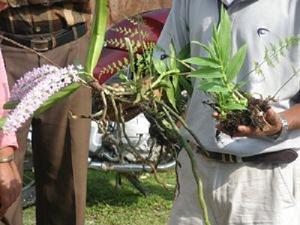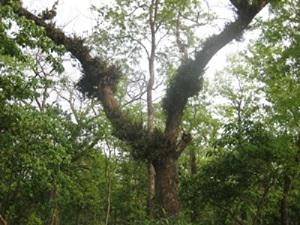Sunita Ulak
The conservation aim of this project is to contribute for the sustainable conservation of orchids with the help of multi spectral groups of people and relocate detached and fallen orchids on suitable host trees. It also aims to empower villagers to make effective provisions at local level for the long and sustainable conservation orchids in its natural state.

Orchid collection for relocation.
The forest area of Kaski district is the paradise for orchids because the region has moist atmosphere and cloudy forest conducive for the growth and development of orchids. Few years before orchids were fully banned for collection and sale in the country but now government has legitimatized the collection and sale except the species listed in CITES appendices. Many rural people have based their livelihoods on harvesting of orchids from community forest and sale in the local market but harvesting of orchids without considering sustainability concept has generated concerns over the conservation of these species. Due to lack of conservation awareness and lack of transfer of suitable harvesting technology, villagers and orchid collectors are exploiting these resources to fetch more money in a shorter time.

Orchid host tree.
On the other hand, excessive grazing, harvesting of host trees for timber and increasing forest fire intensities have deteriorated the natural habitat of orchid. Therefore, this project aims to spread the conservation awareness among the community forest users, villagers, and forest watchers for the sustainable conservation of orchids by using various participatory methodologies and relocate/rehabilitate detached and fallen orchids on the suitable host trees inside the forest. Completion of this programme will considerably increase the level of awareness, participation and knowledge of the community; and develop positive attitude of the people towards the conservation of orchids.
The programme will change the negative belief among the forest user group members and field level technicians that orchids do not hinder growth and development of host timber tree species. Furthermore, community forest users groups and orchid collectors will be empowered to put binding provisions in their forest management plans which guide them to conserve orchids and biodiversity in a more comprehensive way, and eventually leads to the formation of a local community of knowledgeable and empowered citizens engaging in positive environmental actions to protect orchids and biodiversity of the region.